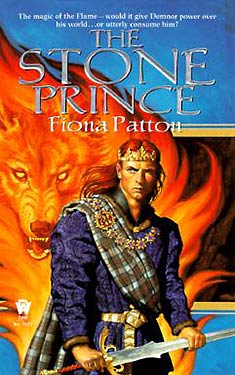Fiona Patton
Completed 12/3/2016 Reviewed 12/7/2016
3 stars
I liked this book. While
it has same-sex relationships, it’s not the great gay fantasy novel, but it’s
good. The author really does her best in
the scenes between the main character Demnor and his companion Kelahnus, and
telling the story about their relationship, from its rocky start to the present
conflict where Demnor has to marry a woman for political reasons. Demnor is a pretty damaged character. He is the heir to throne and the power of the
Living Flame, but he has been shaped by his powerful, emotionally abusive
mother who is the current ruler. So the
story really centers on Demnor and his struggles in life and love and
inheritance, and Kelahnus’ response to it all.
 I really liked Kelahnus.
He’s not just a lover. He’s part
of what you can consider a concubine guild where people are trained to be the
lovers of the hierarchy. They serve the
function of providing companionship until the aristocrat gets married. And even after that, the relationship usually
continues in some form. In the case of
Demnor and Kelahnus though, the two have fallen in love. This creates a problems for Demnor’s future
as Aristok (King) and the need for him to marry for political reasons and provide
an heir. Kelahnus has to navigate
through all of Demnor’s political life while not despairing.
I really liked Kelahnus.
He’s not just a lover. He’s part
of what you can consider a concubine guild where people are trained to be the
lovers of the hierarchy. They serve the
function of providing companionship until the aristocrat gets married. And even after that, the relationship usually
continues in some form. In the case of
Demnor and Kelahnus though, the two have fallen in love. This creates a problems for Demnor’s future
as Aristok (King) and the need for him to marry for political reasons and provide
an heir. Kelahnus has to navigate
through all of Demnor’s political life while not despairing.
The first half of the book was my favorite part, where we
get to know the characters and the special social structure of the world. The second half takes a big turn into
politics. I felt like it dragged,
turning the book into the fantasy equivalent of a tedious space opera. This brought the book to a snail’s crawl for
me, losing the spark of the first half.
This is a shame too because the book had so much going for
it. Besides the companionship structure
and the fluidity of sexuality, gender has a prominent role. The aristocracy can be either male or
female. For example, all the children of
the Arsitok are Princes, even the girls.
Women also serve in the military.
What makes this aspect of the book so great is that it is not an
issue. It just is. It’s really well written in that
respect. And it’s easy to miss if you
don’t pay attention to the pronouns of the soldiers, guards, and
aristocrats.
The magic and spirituality of the Living Flame concept was
really interesting too. Demnor is the
heir of this powerful magic that helps him and his army in battles. I thought it was understated, or perhaps underutilized. The scenes with the flame are predominantly
in the second half of the book. It
almost seems like it’s used sparingly on purpose, perhaps it has a much larger
role in the next books in the series.
Yes, this book is the first of a series. As I stated at the beginning of this review,
I liked it, but I did not love it. I
found the second half somewhat tedious and it put me off from reading the rest
of the series. I was really glad
however, that the book is self-contained.
It doesn’t leave you hanging for the next book in the series. I give the book three stars out of five. Maybe if the author could have edited out
about half of the second half, I would have enjoyed it more. The remaining action could have lifted the
pace and made it a little more exciting.
No comments:
Post a Comment